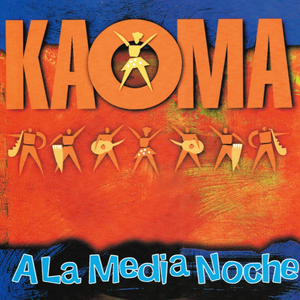"Dançando Lambada" and "Mélodie d'amour" were the next two singles and were also hit singles, although they failed to earn the same success as "Lambada". "Lambada" peaked at number 46 on the U.S. Billboard Hot 100. It reached number 4 in the UK Singles Chart.
The same year, the band released its first album Worldbeat which achieved worldwide success,becoming,along with Beto Barbosa, one of the legends of Brazilian lambada. At the 1990 Lo Nuestro Awards, Kaoma won two awards for Pop Group of the Year and New Pop Artist of the Year.
In 1991, Kaoma released the album Tribal-Pursuit which provided the singles "Danca Tago-Mago" and "Moço do dende".
The band disbanded in 1998 but reformed again in 2006.
Loalwa Braz (3 June 1953 – 19 January 2017)
Lambada is a dance from Pará, Brazil, of African origin. The dance became internationally popular in the 1980s, especially in Latin America and Caribbean countries. It has adopted aspects of dances such as forró, salsa, merengue, maxixe and the carimbó.
Lambada is generally a partner dance. The dancers generally dance with arched legs, with the steps being from side to side, turning or even swaying, and in its original form never front to back, with a pronounced movement of the hips. At the time when the dance became popular, short skirts for women were in fashion and men wore long trousers, and the dance has become associated with such clothing, especially for women wearing short skirts that swirl up when the woman spins around, typically revealing 90s-style thong underwear.
Banto
Kaoma Lyrics
Jump to: Overall Meaning ↴ Line by Line Meaning ↴
Banto ê de lata pra tocar tu-ban
Banto ê
Banto ê ô ê ô
Banto é uma canção de alegria
Liberdade
Alforria
Numa festa em harmonia
Banto é amor ê ô
Banto é união
Gente linda
Valentia
Tens ainda
Desta terra
Passos firmes
Marcas tristes
Coração
Banto é amor ê ô
The lyrics to Kaoma's song "Banto" celebrate joy, freedom, and love. "Banto" is a term used to describe the people and culture of Angola, a country in southwestern Africa. The song highlights the diversity within Angola, giving a shoutout to three ethnic groups: the Cabindas, Benguelas, and Congos. Despite their differences, the lyrics emphasize the unity and harmony among these groups as they come together to celebrate.
The song also acknowledges the hardships and struggles that the Angolan people have faced, as represented by the "triste marcas" or sad marks. The mention of "passos firmes" or firm steps, suggests that despite these difficulties, the people have remained strong and resilient, moving forward with determination and resolve.
Overall, "Banto" is a song of celebration that honors the people, culture, and history of Angola, and acknowledges the challenges they have overcome. The lyrics emphasize the unity, strength, and beauty of the Angolan people, as well as their love for life and for one another.
Line by Line Meaning
Banto ê
This is Banto
Banto ê de lata pra tocar tu-ban
Banto is the sound of the tin drum
Banto ê
This is Banto
Banto ê ô ê ô
This is the rhythm of Banto
Banto é uma canção de alegria
Banto is a joyous song
Liberdade
Freedom
Alforria
Emancipation
Cabindas, benguelas, congôs
Cabindas, Benguelas and Congos
Numa festa em harmonia
Come together in a harmonious celebration
Banto é amor ê ô
Banto is love
Banto é união
Banto is unity
Gente linda
Beautiful people
Valentia
Bravery
Tens ainda
You still have
Desta terra
From this land
Passos firmes
Firm steps
Marcas tristes
Sad marks
Coração
Heart
Banto é amor ê ô
Banto is love
Writer(s): Loalwa Braz, Michael Abihssira
Contributed by Kaylee A. Suggest a correction in the comments below.

Garibaldo55
Kaoma- Banto
Bantu ê
Bantu ê de lata pra tocar tu-ban
Bantu ê
Bantu ê ô ê ô
Bantu é uma canção de alegria
Liberdade
Alforria
Cabindas, benguelas, congôs
Numa festa em harmonia
Bantu é amor ê ô
Bantu é união
Gente linda
Valentia
Tens ainda
Desta terra
Passos firmes
Marcas tristes
Coração
Bantu é amor ê ô
Ionut Andrusca
Finally! After 9 years of searching for this song, I have found it!!! <3
royal gamer
I WAS SEARCHING FOR IT TO,AT THE END I JUST ASKT MY MOM FOR THE NAME
Ioana iza Tabara
Eu l am fredonat ca sa il gasesc google gen na na na ...😂
Masoshi-Dala Benangola
Eu sou bena Bantu ( filho do povo denominado Bantu) Angola. Gostaria dizer que amo essa música 🎸🎷 de mais, algo que me toca na alma 😊❤
Mario Roma
¡Wow! Que hermosa canción. Recién hoy 19/7/23 la estoy conociendo. Esto invita a bailar... Gracias Loalwa por darnos tan preciosa voz y que Dios te tenga en su gloria. 🙏🏿🥺
Sergey Krijanovskiy
Спасибо , Kaoma, за этот шедевр🇷🇺🇧🇷❤❤❤
Garibaldo55
Kaoma- Banto
Bantu ê
Bantu ê de lata pra tocar tu-ban
Bantu ê
Bantu ê ô ê ô
Bantu é uma canção de alegria
Liberdade
Alforria
Cabindas, benguelas, congôs
Numa festa em harmonia
Bantu é amor ê ô
Bantu é união
Gente linda
Valentia
Tens ainda
Desta terra
Passos firmes
Marcas tristes
Coração
Bantu é amor ê ô
Jaime Castaño
Colombiano os saluda Brasil lo mejor🇨🇴👍😀🇧🇷
Santiago Silva
Descanse em Paz !! Uma das vozes mais bonitas do Brasil! Eternamente Loalwa!:)
Jimi Mattila
Eu amo samba e música do Brasil❤❤🎶🎶🇧🇷